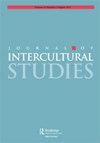论成为他者。波罗的海和尼日利亚移民在爱尔兰的经历
IF 1
Q3 SOCIOLOGY
引用次数: 0
摘要
摘要本文通过波罗的海和尼日利亚移民在爱尔兰的经历,探讨了他者和他者的概念。通过观察爱尔兰社会中被视为“他者”的两个群体的种族化,我们的工作发现,这两个群体基于阶级、族裔和种族以不同的方式体验着他者。这两个群体的种族化方式随后影响了他们在爱尔兰社会中的移民融合道路,因为他们是不同的新来者,在爱尔兰的种族等级制度中处于不同的地位。肤色等明显的差异起着重要作用,尤其是对于第二代尼日利亚受访者来说,当他们在爱尔兰不被接受为爱尔兰人时。这篇论文不仅为有关种族和种族化的文献做出了贡献,还展示了爱尔兰社会中种族化的复杂性。本文章由计算机程序翻译,如有差异,请以英文原文为准。
On Being the Other. The Experiences of Baltic and Nigerian Migrants in Ireland
ABSTRACT This article explores the concepts of othering and the Other through the experiences of Baltic and Nigerian migrants in Ireland. By looking at the racialisation of both groups, considered the Other within Irish society, our work finds that these two groups experience othering in different ways based on class, ethnicity, and race. The way these two groups are racialised subsequently influences their pathways of migrant integration within Irish society as distinct newcomers who are positioned differently within a racial hierarchy in Ireland. Overt differences like skin colour play an important role, especially for second-generation Nigerian interviewees, when not being accepted as Irish in Ireland. The paper not only contributes to the literature on race and racialisation but also demonstrates the complexity of racialisation within Irish society.
求助全文
通过发布文献求助,成功后即可免费获取论文全文。
去求助
来源期刊

Journal of Intercultural Studies
SOCIOLOGY-
CiteScore
1.80
自引率
10.00%
发文量
67
期刊介绍:
Journal of Intercultural Studies showcases innovative scholarship about emerging cultural formations, intercultural negotiations and contemporary challenges to cultures and identities. It welcomes theoretically informed articles from diverse disciplines that contribute to the following discussions: -Reconceptualising notions of nationhood, citizenship and belonging; -Questioning theories of diaspora, transnationalism, hybridity and ‘border crossing’, and their contextualised applications; -Exploring the contemporary sociocultural formations of whiteness, ethnicity, racialization, postcolonialism and indigeneity -Examining how past and contemporary key scholars can inform current thinking on intercultural knowledge, multiculturalism, race and cultural identity. Journal of Intercultural Studies is an international, interdisciplinary journal that particularly encourages contributions from scholars in cultural studies, sociology, migration studies, literary studies, gender studies, anthropology, cultural geography, urban studies, race and ethnic studies.
 求助内容:
求助内容: 应助结果提醒方式:
应助结果提醒方式:


